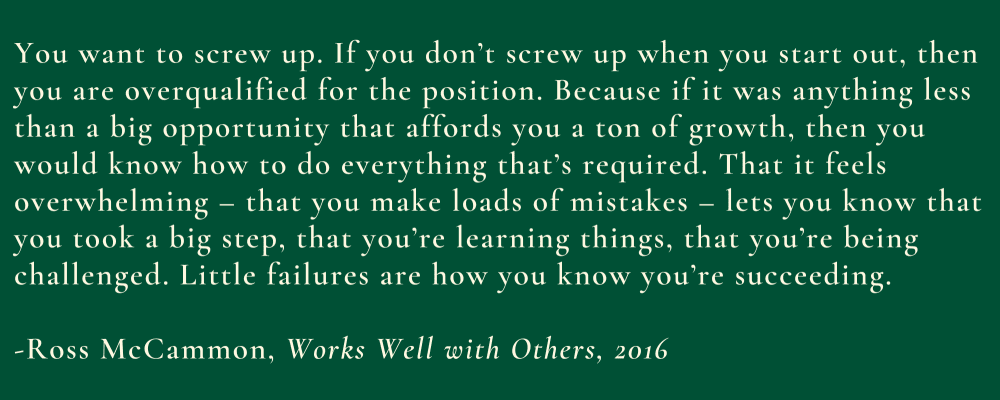Adventures in Onboarding: 90 + Days as a Program Coordinator for UNC Charlotte’s Corporate Training and Executive Education

Humans spend a lot of time at work. I want to contribute to making the workplace better for everyone, no matter the business. My passion for workplace culture stems from my passion for life-long learning and non-traditional pathways that bring rich and dynamic experience into the workforce. That is what brought me to UNC Charlotte’s School of Professional Studies – first as a student, then as a program producer, and now as a program coordinator.
As a life-long learner, I never miss a chance to share what I have learned from a new or challenging experience. Read on to learn a little about my first 90 + days with the School of Professional Studies as a Program Coordinator.
What is a program coordinator?
The Program Coordinator focuses on all the aspects that go into planning an enriching development experience. While the Program Coordinator doesn’t lead a team, the Program Coordinator (PC) must be a leader. When a corporate training program agreement is signed with our clients, the ball is passed to me to manage and execute the entire program planning process from scheduling resources to enrollment, catering and instructor contracts, as well as evaluations and budget management. The PC also communicates with the client and program participants before, during, and after the program is facilitated. And, Corporate Training and Executive Education (CTEE) doesn’t just handle one client at a time. We have multiple programs underway at once, all at different points in the program lifecycle.
The PC position is unique within the larger School of Professional Studies. There is only one of my kind in our department (though I have heard lore of a population once greater than just myself!). While a lot of roles fit neatly within a department like accounting, enrollment, or marketing, the PC is a cross-trained slayer. They might create graphics and social media posts in the morning, then dedicate their afternoon to being onsite at a corporate program, while simultaneously working to resolve client account balances or organizing course evaluation data.
day 1 – day 30
I said goodbye to my last job on a Friday and said hello to this role the following Tuesday.
The learning curve was steep. Despite my experience and passion for managing programs, there were new processes and systems to learn. Because the role is so unique to the department, my team was relying on me to figure it out fast because we had active projects that needed to be managed in real time. One of the most unique things about my onboarding experience was the opportunity to learn my job duties from the person who held my job prior to me, Dayle Janus. Dayle was promoted to a Program Director role within the School of Professional Studies and was able to take time while starting her new role, to help me get a grip on mine. In my experience, it is rare to have the person you are replacing available to help you. Dayle became my greatest resource.
CTEE’s files were abundant with evidence of Dayle documenting her role and the nuances of her work processes. I cannot imagine feeling as confident as I do in my role at the 4-month mark without having Dayle and her documentation available to me. Through time spent with Dayle, cultural storytelling and critical experience was shared with me.
While learning my job and executing my duties simultaneously, I was also learning how to work in a totally different way. The PC role enjoys the privilege of a hybrid work model, but learning a new skill and then putting it into practice at a distance can be a little disorienting. Not having the instant validation that comes with a coworker sitting directly next to you was a little awkward for me. Somehow, I felt like I was being more interruptive by messaging or calling my coworkers or supervisor for help with something than popping into someone’s office. That has changed by now, but it took some getting used to! Not only was I learning my new role at a distance from my team, but I was learning about my organization’s culture and even meeting my coworkers for the first time online as well.
The first 30 days were challenging. I went from being an expert in one role at one organization, to a total newbie in another role, organization, and way of work. Some things clicked immediately, but for a good portion of my duties, I wasn’t feeling that “click” yet. I could feel myself closing in on it, but I couldn’t see it yet. It was like I had the edge pieces of a puzzle all connected, but all the other pieces were still just sorted by color.
Day 31 – Day 60

Each day was a new day to try it all out and get those inner pieces together. Truly some days were total productivity duds that left me with even more questions than I had before. Then there were days where I felt like I had exactly enough information to execute my job duties. The key was to just keep asking questions. I asked questions even though I sometimes felt like I should have already known the answers. I even said “yes and…” to taking on new tasks even when I felt like I was struggling to keep up. But I was searching for that “click”. The more experience I gained, the more questions I asked, and the closer I got to that click.
My confidence had taken a big hit going from being a resource to my team in my previous role to being a beginner again. But to truly build on your skill sets and grow, you have to put those skills to the test.
My communication skills were being put to the test. Working remotely provided a variety of communication and co-working methods, which has been great, but with multiple Program Directors competing for my time on their agreements, it felt like floodwaters that would never subside. For the first time in my career, I was struggling to prioritize all of these tasks.
I have always prided myself on anticipating the needs of business and being proactive, but without that “click,” I knew I didn’t have enough information to act as independently as I wanted to. I didn’t want to be perceived as lacking a sense of urgency because of this. I knew I had to take a beat and resolve this issue sooner than later.
My ability to anticipate and be proactive is one trait that sets me apart. It was one of my superpowers. I knew I needed to be able to communicate a sense of urgency in a different way than I did when I was working with a team in the office. Body language was no longer enough. The way I communicated with my last team was not enough.

I reflected on my decades of customer service experience and considered the language of urgency (I hope to write more about what I have discovered about the language of urgency in the future), but I tried out a few things as an experiment. When I realized what was working for me and my team, I quickly integrated these things into my workflow. Prioritization for this role became clearer once I was able to interpret the urgency of each communication method being used through each workday.
I also had to put my adaptability to the test. While it isn’t always fun, I typically welcome the challenge of change and the need to adapt. Life on this planet as we know it exists because it met the challenges of adaptation, but we all have such deeply grooved neural pathways that can get in the way. My deeply grooved pathways were beginning to show themselves. I was attempting to apply how I already liked to work without ever considering I might like to work another way. I had to stop trying to adapt the work to my preference and instead adjust my preference to the work. This role has so many moving parts and I love it, but I was trapped in trying to fit the role into old pathways because that is what has always worked for me. This was a side of my adaptability I hadn’t recognized before and this is ultimately what created the intellectual space for me to build a new workflow, allowing me to begin anticipating business needs, be proactive, and communicate with more impact.
All of the puzzle pieces seemed to be coming together in a couple corners, but there were still some pieces in the middle that could really end up anywhere. But just like when you’re putting a puzzle together, you have to put those pieces aside. At least for a little while.
Day 60 and beyond!

As time went on, I started referencing those puzzle pieces for specific shapes or colors that matched the spaces that needed to be filled. One by one, clicking into place until a bigger picture began to form.
By no means am I saying it only took me 60 days (or even 90 days) to master my new role here at UNC Charlotte. What I am saying is that after nine years of routine in my previous role, I underestimated the transition into something new. Regardless of how relevant my experience was and how active I am in my own professional development and growth, starting over in a new role with a new organization can more expertly be described as a “vibe” than anything else. When my friends and family ask me how my new job is going, the biggest take away for me is how challenging it has been to go from expert to beginner in just a single business day.
…the biggest take away for me is how challenging it has been to go from expert to beginner in just a single business day.
For all the cliches that come along with change and growth, they are cliches for a reason. Change is inevitable, whether you initiate that change or not. And from change comes the opportunity for growth, whether you fully realize what that will look like and feel like in the process or not.
On the other side of that change, however, is such a wild new perspective worth the temporary upheaval. Not only do you learn new skills and ways to work, but by embracing the opportunity for change in starting a new role with a new organization, I have learned a lot about myself personally and professionally. Since I started in February, I have successfully completed 18 agreements from start to finish. By the time this posts, that number will have increased while I simultaneously close out even more agreements that were in progress before I started. I will also continuing to execute on a handful of long-term programs that run into the next fiscal year, and stay busy launching new contracts each week. On top of that, I am embracing opportunities to learn alongside my coworkers at conferences and school-sponsored events, as well as exploring ways to collaborate and put new technology to use.
We’ve just welcomed our newest Program Director to the team and I feel ready to contribute to the success of the programs they bring under agreement. With my reinforced communication skills and supercharged adaptability, I am more ready than ever to forge new relationships, new neural pathways, and make my mark on the culture of workplaces – no matter the industry!
Works Cited: Mccammon, Ross. Works Well with Others : Shaking Hands, Shutting Up, and Other Crucial Skills in Business That No One Ever Teaches You. New York, Dutton, 2016.